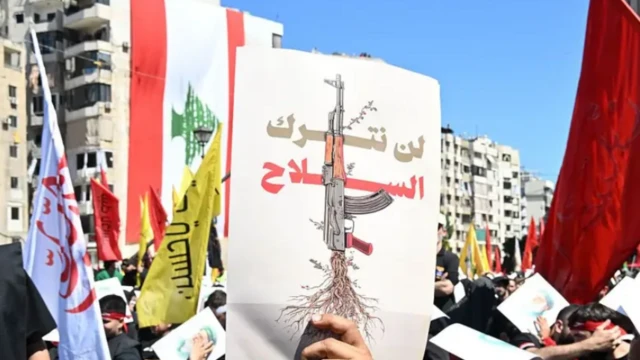
Hezbollah warns of the specter of "civil war" waving on the horizon, and the Lebanese government describes the statements as "unacceptable"
On Friday, the Lebanese Hezbollah said that the specter of civil war is looming on the horizon and that there will be no "life" in Lebanon if the government sought to confront or eliminate the party.
The Lebanese government wants to control the party's weapons, according to a plan backed by the United States in the aftermath of the Israeli war against Lebanon, which Israel says is targeting Hezbollah, which was established four decades ago with the support of the Iranian Revolutionary Guard.
But the party resists the pressure to remove its weapon, indicating that this cannot happen until Israel ends its strikes and "occupying" the southern sector of Lebanon.
He said, Naim Qasim, the Secretary -General of Hezbollah, in a televised speech: "This is our country all.
In response, the Lebanese Prime Minister, Nawaf Salam, said that Qasim's statements carry an implicit threat to the civil war, describing it as "unacceptable."
The most finished reading
Salam said, through a post on his account on the X platform, quoting an interview with Al -Sharq Al -Awsat newspaper: "No party to Lebanon is declared to carry weapons outside the framework of the Lebanese state."
Last week, the Lebanese government was assigned the army to limit the weapons in the hands of the state security forces only, a step that angered Hezbollah.
Qasim accused the government of implementing "an American -Israeli order to eliminate the resistance, even if this leads to a civil war and an internal conflict."
However, the Lebanese Prime Minister Nawaf Salam said on the X -platform that "talking about the Lebanese government is carrying out an American -Israeli project that is a reprehensible talk ... Our Lebanese -Lebanese decisions are made in our council and no one dictates it to us."
He added: "The Taif Agreement is our charter, and it explicitly stipulates" the extension of the authority of the Lebanese state over its entire lands with its own forces. "
A possible dialogue
Naim Qassem also said that Hezbollah and the Amal movement, its Shiite ally, decided to postpone the establishment of any protests in the streets.
He explained: Qasim, that "there is still room for discussion and amendments and reaching a political solution before the situation escalated to a confrontation that no one wants."
But he said: "If it is imposed on us, we are ready, and we have no other option ... then, there will be protests in the streets, throughout Lebanon, and it will reach the American embassy."
In October 2023, the conflict between Hezbollah and Israel was fueling, and left widespread destruction in parts of Lebanon, when the party opened fire on Israeli sites along the southern border in solidarity with the Palestinian Hamas movement at the beginning of the Gaza war.
Israel directed painful strikes to Hezbollah during the past two years, killing many of his leading leaders, including former leader Hassan Nasrallah, and 5,000 of his fighters, as well as the destruction of a large part of his arsenal, according to Reuters.
Although the ceasefire reached in November, Israel says it will continue its attacks on Hezbollah's military targets until its weapon is removed.
Hezbollah and the Amal Movement still have political influence, as they always support government ministers, and control the Shiite seats in Parliament.
However, for the first time in years, the two "broken third" in ministerial positions, which had previously enabled them to veto the government's decisions.
The head of the Iranian National Security Council, Ali Larijani, had visited Beirut this week, and had talks with Naim Qasim, as well as with the President of the Lebanese Republic, Joseph Aoun.
Iran has expressed its opposition to the government's plan to disarm, and pledged to continue to provide support.





.jpeg)


ليست هناك تعليقات:
إرسال تعليق